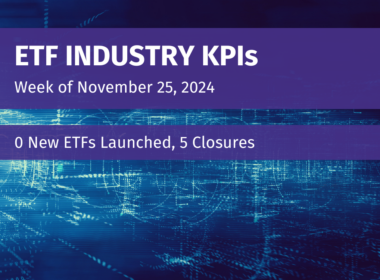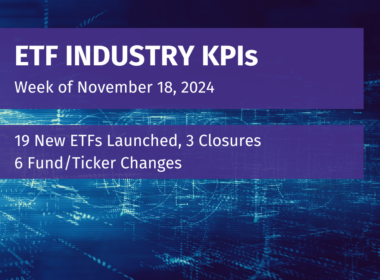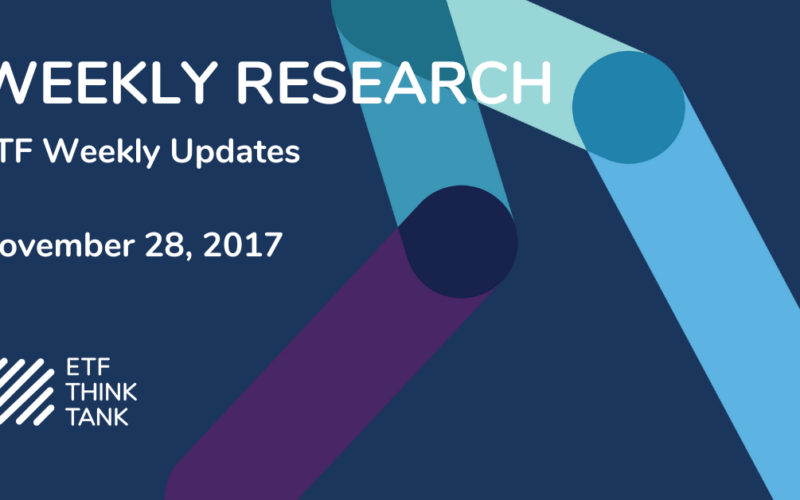Each week we discussed the continued growth of ETF assets which has annualized at about 20% a year. We often discuss record flows or like last week a record number of 35 ETF launches. This week we are addressing a common question as to whether that growth is only driven by fee compression and therefore not captured in TETFindex constituent’s profits. The headlines often refer to this phenomenon as the “Race to Zero” which is somewhat contradictory since low cost beta or market exposure has been so beneficial to investors. About a month ago State Street entered the proverbial race with a massive reduction in fees on 15 core products and a coordinated partnership with TD Ameritrade in attempt to gain market share from Vanguard.
Ishares/Blackrock had already created similar offerings and partnerships. So yes this, means Beta is essentially free from multiple top tier ETF sponsors which is extremely good for investors, but is it bad for the ETF ecosystem?
One of ETFs greatest attributes is their alignment with the end investor. When you are offering a product or service that benefits the client you have solved the largest business challenge. We often speak of “innovation” being the driver of ETF growth, which doesn’t mean just product development. Innovation can drive unique revenue models like Security Lending, platform fee sharing models or simply client loyalty from which to share higher margin product. Take Ishares/Blackrock as an example of successful ETF business innovation. Over the past 10 years their revenue has more than doubled and they have maintained margins, this track record is not what one would expect from one of the leaders in the “Race to Zero”.
BlackRock, State Street, Invesco and Charles Schwab are great examples of TETFindex constituents which have benefited investors by offering essentially free Beta but have allowed shareholders to benefit from that growth in innovative business and revenue models.
Another ETF growth trend that contradicts the “fee war” headlines is innovation in product. A few months ago, Bloomberg noted the 5 fastest growing ETFs:
The average expense ratio for these five ETFs is .86%. That number is still lower than most mutual funds but much higher than most ETFs. This data shows that investors are willing to pay for research, performance, unique exposures and structural innovations.
LAST WEEK’S ETF LAUNCHES
- Direxion Daily Pharmaceutical & Medical Bull 3X Shares (PILL)
- Eaton Vance Oaktree Diversified Credit NextShares (OKDCC)
- ProShares Decline of the Retail Store ETF (EMTY)
- ProShares Long Online/Short Stores ETF (CLIX)
ETF LAUNCH OF THE WEEK
After a record week with 35 launches, things have slowed down with only 4 last week. CLIX is our launch of the week since it fits with our theme of structural innovation. This is a long/short ETF with 50% market exposure. It takes the popular Hedge fund pairs trade of shorting brick and mortar retailers while going long their online competitors. This is long IBUY and short 50% XRT in one ETF. An honorable mention for this week is PILL because this is its second act. The original version of PILL closed in March and offered 2X leverage, the new resurrection brings us 3x leverage on pharmaceutical stocks.
TETF INDEX PERFORMANCE Vs. LEADING FINANCIAL INDEXES
UNDERLYING TOP/BOTTOM 10 HOLDINGS PERFORMANCE
ETF AND MUTUAL FUND – AUM & FLOWS (IN BILLIONS)
YEARLY ESTIMATED SALES GROWTH BY SECTOR
YEARLY ESTIMATED EPS GROWTH BY SECTOR
DOMESTIC VS INTERNATIONAL EQUITY [ QUARTERLY IN BILLIONS]
FLOWS BY ASSET CLASS [ QUARTERLY IN BILLIONS]











